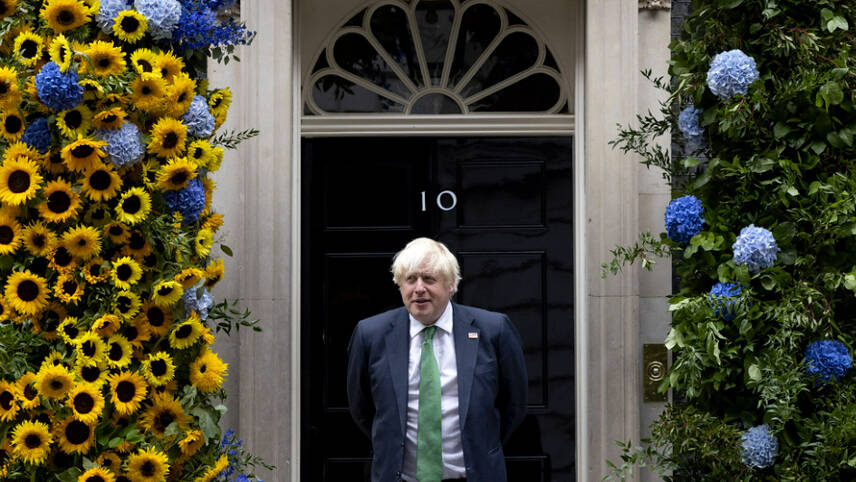Register for free and continue reading
Join our growing army of changemakers and get unlimited access to our premium content

Image: Simon Dawson / No 10 Downing Street. CC BY-NC-ND 2.0. https://www.flickr.com/photos/number10gov/52306872590/
Johnson visited Sizewell in Suffolk this morning (1 September) to deliver a small speech, then provided a televised, longer speech in the afternoon from London. As expected, much of the focus was on the energy price crisis and the Government’s plans to increase low-carbon power generation.
Following weeks of speculation that Johnson was ready to approve new funding for EDF’s Sizewell C nuclear plant – or, perhaps, that he’d already done so without consulting Ministers – he confirmed today that the Government has promised £700m for the project.
Johnson said “we need to pull our national finger out and get on with Sizewell C”, adding: “In the course of the next few weeks, I am absolutely confident that it will get over the line, and we will get it over the line because it would be absolute madness not to.”
Business and Energy Secretary Kwasi Kwarteng granted development consent for the project in late July, stating that there was a “very substantial and urgent need” for the plant in the face of the energy trilemma, regardless of concerns about the facility’s impacts on local nature and its water footprint.
The Government had already committed to taking a 20% stake in the £20bn project. Lead investor and developer, EDF, is also set to take a 20% stake. Investment for the remaining 60% is still being sought, it is understood.
Some groups, including Prospect Union, were hoping that Johnson would be able to confirm an investment decision before his successor is elected on 5 September. The Union’s senior deputy general secretary Sue Ferns accused the Conservatives of “painfully slow progress” on nuclear development over the past decade. Similarly, GMB’s national secretary Andy Prendergast said the announcement was “a bleated step in the right direction”.
Other organisations, which have been campaigning against Sizewell C, have argued that the Government would do better to invest in insulation and renewable energy, which can be more quickly deployed. Construction at Sizewell C is expected to take at least nine years.
Greenpeace UK’s chief scientist Dr Doug Parr said: “This money could insulate huge numbers of draughty homes and cut next year’s bills, instead of being thrown on the slow-burning financial bonfire that is EDF, to increase our bills for decades… The contrast between these lumbering white elephants and the dynamic, cost-cutting, innovative technologies in the renewables sector couldn’t be more striking.”
Johnson said: “No more national myopia, no more short-termism – let’s think about the future, let’s think about our kids and our grandchildren, about the next generation.”
Frack-free future?
Johnson also used his platform to encourage his successor to lean into renewables and not to lift the UK’s ban on fracking in the face of the current price crisis.
He said: “I tell everybody who thinks hydrocarbons are the only answer, we should get fracking and all that, offshore wind is now the cheapest form of electricity in this country. Offshore wind is nine times cheaper than gas.”
The comments were doubtless angled at his successor. Frontrunner Liz Truss has been very pro-fossil-fuel and largely anti-renewables during her campaign, particularly solar. Truss, who worked for Shell between 1996 and 2000, has indicated that she is against the current windfall tax on oil and gas majors and stated that she would allow fracking in areas where local communities support it. She has also made headlines this week with talk of approving more than 100 new oil and gas licenses in the North Sea – a proposal slammed by climate scientists.
Like Truss, Sunak has stated that he would enable fracking in places with local support. There is currently a ban on the practice, after residents in Lincolnshire experienced tremors linked to local operations. Kwarteng has asked the British Geological Survey to assess whether processes could be adapted to reduce tremor risk and environmental impact. Under Truss, he would likely become Chancellor.
Talk of energy efficiency was notably absent from Johnson’s speech, despite mounting calls for intervention. Twitter users have been quick to argue that Johnson’s call for people to buy a new kettle to reduce their electricity bills this winter is out of touch. Ofgem confirmed last month that the domestic energy price cap will increase by 80% in October, largely due to high gas prices.


Please login or Register to leave a comment.